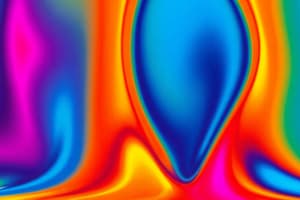Podcast
Questions and Answers
What is the main goal of basic science?
What is the main goal of basic science?
- To validate results through peer review
- To find practical applications for scientific knowledge
- To solve immediate problems using scientific methods
- To expand knowledge without concern for its application (correct)
Which of the following is NOT a property of life?
Which of the following is NOT a property of life?
- Sensory response to stimuli
- Circular motion (correct)
- Energy processing
- Regulation
What is the correct sequence of the scientific paper format?
What is the correct sequence of the scientific paper format?
- Abstract, Introduction, Methods, Results, Discussion, Literature Cited (correct)
- Literature Cited, Abstract, Discussion, Results, Methods, Introduction
- Introduction, Results, Methods, Discussion, Literature Cited, Abstract
- Abstract, Methods, Results, Discussion, Introduction, Literature Cited
Which of the following statements about applied science is correct?
Which of the following statements about applied science is correct?
In the context of biological organization, which level comes after cells?
In the context of biological organization, which level comes after cells?
What distinguishes prokaryotes from eukaryotes?
What distinguishes prokaryotes from eukaryotes?
Which of the following describes homeostasis?
Which of the following describes homeostasis?
Which is NOT one of the three domains used in the phylogenetic tree of life?
Which is NOT one of the three domains used in the phylogenetic tree of life?
What is the primary focus of biology?
What is the primary focus of biology?
What is the scientific method primarily used for?
What is the scientific method primarily used for?
Which of the following describes inductive reasoning?
Which of the following describes inductive reasoning?
What defines a hypothesis in the context of the scientific method?
What defines a hypothesis in the context of the scientific method?
Why are certain strains of Escherichia coli significant in biology?
Why are certain strains of Escherichia coli significant in biology?
What is a key characteristic of the natural sciences?
What is a key characteristic of the natural sciences?
How does deductive reasoning function in scientific research?
How does deductive reasoning function in scientific research?
Flashcards are hidden until you start studying
Study Notes
Basic vs. Applied Science
- Basic science (or pure science) aims to expand knowledge without immediate practical applications.
- Applied science focuses on using scientific knowledge to solve specific, immediate problems.
Process of Science: Peer Review
- Scientific progress relies on peer-reviewed literature, ensuring quality and credibility.
- Peer review involves blind assessments by reviewers who evaluate submitted experiments and results.
- Typical structure of peer-reviewed papers includes:
- Abstract
- Introduction
- Methods
- Results
- Discussion
- Literature Cited
Properties of Life
- Life exhibits seven essential properties:
- Order
- Sensitivity or response to stimuli
- Reproduction
- Growth and development
- Regulation
- Homeostasis
- Energy processing
Order
- Living organisms, like toads, display highly organized structures comprising cells, tissues, organs, and organ systems.
Response to Stimuli
- Plants like Mimosa pudica respond to touch by drooping and folding leaves, demonstrating sensitivity to environmental stimuli.
Levels of Biological Organization
- Hierarchical organization of life forms:
- Atoms
- Molecules
- Macromolecules
- Organelles
- Cells
- Tissues
- Organs and organ systems
- Organisms, populations, and communities
- Ecosystems
- Biosphere
Diversity of Life
- Life is categorized into three domains derived from ribosomal RNA sequencing:
- Bacteria (prokaryotic, single-celled)
- Archaea (prokaryotic, single-celled)
- Eukarya (includes all eukaryotic organisms)
Biology
- Biology is the study of life and encompasses living organisms and their interactions with each other and the environment.
- Scientific knowledge relies on general truths and laws tested by the scientific method.
The Scientific Method
- A structured approach to scientific inquiry that includes defined steps: experimentation, observation, hypothesis testing.
- If a hypothesis fails to be supported by data, it can be revised or replaced.
Scientific Reasoning
- Inductive reasoning derives generalized conclusions from specific observations.
- Deductive reasoning applies general principles to predict specific outcomes.
- Conclusions from inductive reasoning may also serve as premises for further inductive reasoning, emphasizing the interconnected nature of scientific thought.
Studying That Suits You
Use AI to generate personalized quizzes and flashcards to suit your learning preferences.




